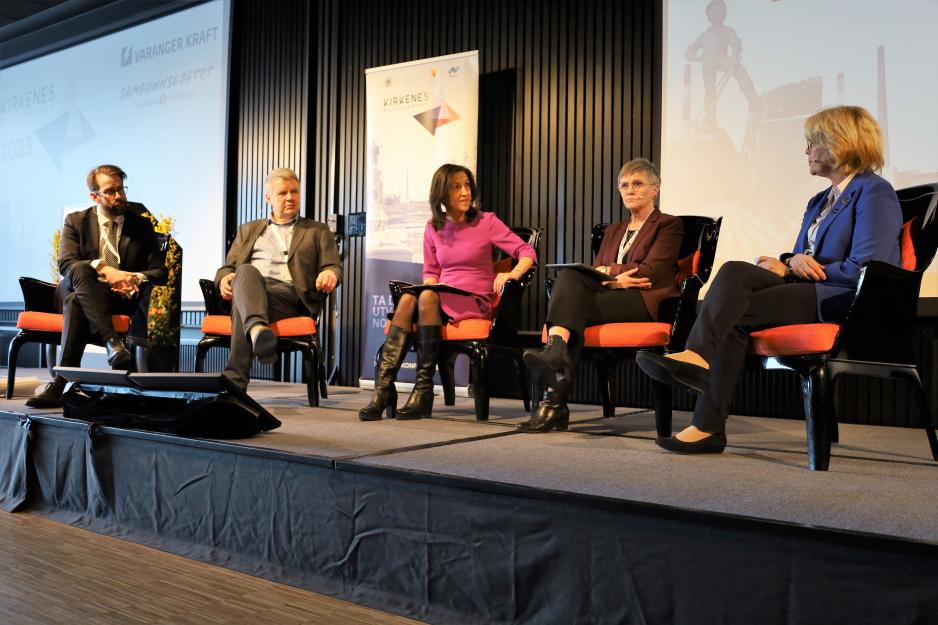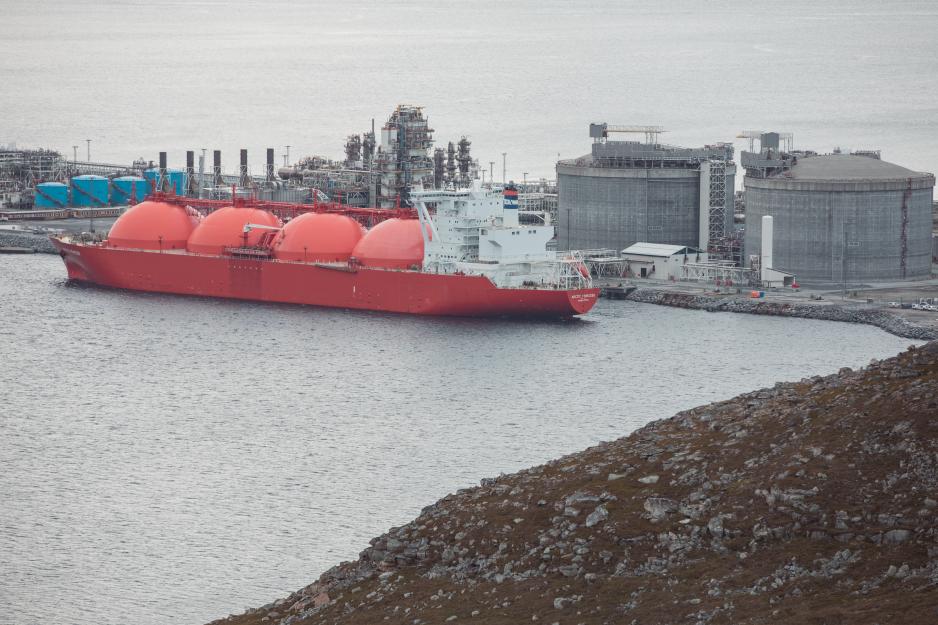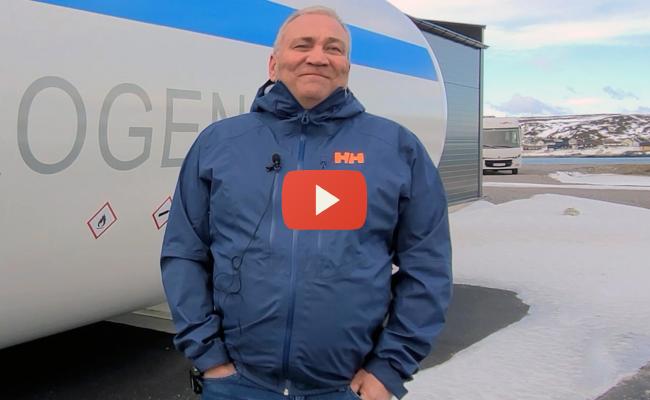Energy CEO in Finnmark: We Will Not Be Able to Establish Businesses and Industry

From the left: State Secretary Amund Vik (Labor) of the Norwegian Ministry of Petroleum and Energy, CEO of Varanger Kraft Terje Skansen, moderator Siri Lill Mannes, Thema partner Berit Tennbak, and Renewables Norway CEO Åslaug Haga. (Photo: Hilde Bye/High North News)
The energy situation in Eastern Finnmark: "This is serious. As long as we do not have the grid capacity to develop anything here, people will relocate. Then there will be no jobs and development," says CEO Terje Skansen of Varanger Kraft.
"The challenge is a lack of grid capacity. We will not be able to establish businesses and industry. The capacity is completely exceeded and if a small industrial business applies for connection to the network, it will be declined."
This was pointed out by CEO Terje Skansen of Varanger Kraft during the Kirkenes Conference on Thursday during a panel discussion that dealt with the energy situation in Easter Finnmark in Northern Norway.
"This is serious. As long as we do not have the grid capacity to develop anything here, people will relocate. Then there will be no jobs and development," Skansen adds.
According to Skansen, the energy crisis does not only apply to Eastern Finnmark. It is critical all over the country – including in Western Finnmark and the Alta region, in which businesses are now being refused connection to the power grid.
"That is because everything is currently reserved for Melkøya," he states.
We feel that no decisions are being made.
"We feel that nothing is happening"
Equinor wants to electrify the gas production at the LNG facility on Melkøya outside Hammerfest in Western Finnmark. The facility receives and processes natural gas from the Snow White field in the Barents Sea. Electrification of the gas facility naturally demands enormous amounts of energy. At the same time, the energy situation in Finnmark, and especially Eastern Finnmark, is already under pressure.
When moderator Siri Lill Mannes asks Skansen what he wants to happen, he answers that they need decisions in order to get a strengthened power grid into Finnmark:
"Without the electrification of Melkøya. Again, it will steal all capacity."
Plans have been made to establish a 420kV power line from Western Finnmark to Eastern Finnmark, which will improve the power grid in the region. One of the stretches on the line, which goes from Lebesby to Varangerbotn, will precisely improve the grid capacity in the eastern parts of Finnmark. Statnett, the system operator in the Norwegian energy system, has applied for a concession to establish a 420kV line from Skaidi to Hammerfest in the west. This decision is based on Equinor's plans to electrify their facility on Melkøya and the energy demand that this triggers, writes Statnett in a press release.
To High North News, Skansen has previously explained that the grid will be drained of large amounts of electricity through the lines into Hammerfest and Melkøya. Even after the 420kV line going east has been built, it therefore seems like the capacity in the eastern county will continue to be limited.
"Statnett has done the work and applied for a concession. I respect that the process takes a long time. However, we feel that no decisions are being made and that nothing is happening, said Skansen during the conference. He has previously pointed out that the much-needed 420kV line will likely not be in place in Eastern Finnmark before 2027-2028 at the earliest.

Photo of the LNG facility Melkøya just outside of Hammerfest. (Photo: Ole Jørgen Bratland)
"The processing must be quicker"
State Secretary Amund Vik of the Norwegian Ministry of Petroleum and Energy agrees that there is a need to strengthen the power grid in Northern Norway and Finnmark.
"We need to strengthen the processing so that the concession process can move quicker."
The government was recently presented with the completed report from the Energy Commission, which points to a number of measures and recommendations that will contribute to an energy surplus in Norway.
"While we are following up on these things, we have increased the allocation for case processing both in the ministry and in NVE (the Norwegian Water Resources and Energy Directorate). We see that this is already having an effect and that things are taking less time, but we are not where we want to be yet," Vik continued.
"There is a reason why these things take time. We need to do things faster, but also better, and in a way that does not create major pushback in the society," he added.
CEO Åslaug Haga of Renewables Norway believed that it must be possible to run several processes in parallel and she also points out the need to reduce the processing time. Concessions are precisely the basis for a greater grid and production," she said.
She pointed out that access to energy has almost been taken for granted in Norway; an issue that has gone under the radar for many.
"Now we have reached a situation with the war in Europe, increased energy prices, as well as a green shift. This is very urgent, especially in Finnmark," Haga said and added:
"First we need networks. In Finnmark, we need a double 420kV line from Balsfjord to Skaidi, which must be extended to Eastern Finnmark. It is not good enough that this takes 10-12 years to get in order. We are in a unique security policy situation; it is meaningless that we in Finnmark are to go with open eyes into a situation in which we have no jobs and people are relocating."
The new green industry that we want is much more energy intensive than the old power industry.
A question of order
Skansen of Varanger Kraft says he is shocked that electrifying Melkøya is considered before the rest of the county is electrified.
"We cannot make such a decision and leave the rest of the country in the dark."
Thema partner, Berit Tennbak, has chaired the Energy Commission and points out that an order is necessary.
"Some things are more time-critical than others. But one cannot do everything everywhere all at once. We need a division of labor and cannot expect Statnett to have the expertise to assess the security situation in Finnmark and prioritize different areas," she pointed out and added that the politicians must step in and clarify how things should be prioritized.
"There is an enormous demand for energy if we are to achieve the climate aims and establish a new green industry. The new green industry that we want is much more energy intensive than the old power industry. If we are to achieve our goals, we must get started."
Also read
This article was originally published in Norwegian and has been translated by Birgitte Annie Molid Martinussen.


